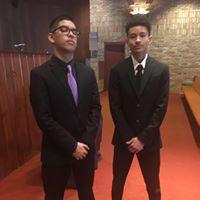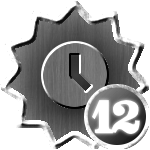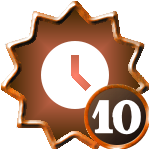-
Posts
1,044 -
Joined
-
Last visited
-
Days Won
14
Black Orpheus last won the day on January 29 2012
Black Orpheus had the most liked content!
About Black Orpheus

Contact Methods
-
Website URL
http://austinshadduck.com
Profile Information
-
Gender
Male
-
Location
New York City
-
Occupation
Composer/Freelance Musician
-
Notation Software/Sequencers
Finale 2011
-
Instruments Played
Saxophone, Shakuhachi
Recent Profile Visitors
Black Orpheus's Achievements
-
I've never seen double- or triple-dotted "fermatas;" B and C are the symbols I sometimes see for jeté /ricochet (bowed string techniques).
-

Is Formal Training In Composition Necessary ?
Black Orpheus replied to luderart's topic in Advice and Techniques
Oh. I would have gotten it if you said Chuck Norris. Maybe. This, on both counts, though I can't help but feel like Weber is to classical music what Nickelback is to rock. Yeah, it's been like that for a long time. The side bar is ugly.- 109 replies
-
- composition
- practice
- (and 4 more)
-

Is Formal Training In Composition Necessary ?
Black Orpheus replied to luderart's topic in Advice and Techniques
What? Glass studied at Juilliard and later in Paris with Boulanger. And Weber studied at the Royal College of Music (though I can't say what good that did him).- 109 replies
-
- composition
- practice
- (and 4 more)
-

Is Formal Training In Composition Necessary ?
Black Orpheus replied to luderart's topic in Advice and Techniques
It depends on what you want out of composition. If you're writing for your own enjoyment as a hobby, then you don't need formal training. Training might make some aspects of the composition process easier, but it's certainly not necessary, especially if you already play an instrument. If you want to make a living as a composer, then formal training is pretty much mandatory, unless maybe you perform in and write music for a specific ensemble to develop your chops.- 109 replies
-
- composition
- practice
- (and 4 more)
-
Or you could have Flute 1 Flute 2 (or Flute 1, 2 if you're able to put the parts on the same staff) Alto Sax. 1 (Flute, Clarinet) Alto Sax. 2 (Clarinet) Tenor Sax. 1 (Oboe) Tenor Sax. 2 (Alto Sax.) [this could be Alto Sax. 3 instead if alto is used more frequently] Tenor Sax. 3 (Bass Clarinet) Baritone Sax. (Alto Sax.) Just an idea, especially if you're thinking of the piece like a big band chart, but the score order is really going to depend on how frequently a player is on a specific instrument and on your voicings.
-
How is the music divided? Are there acts or scenes or movements? I'm in the habit of keeping separate Finale files for each potentially independent section of a piece. That way if I add to a section later on I don't have to deal with format issues that sometimes pop up (a habit I developed from using older versions of the program and from dealing with conversions of old files to newer versions of Finale; as a bonus, separated files are smaller and easier to scroll through/work with). I either append the files together at the very end so I can check that my formattings/margins/space between systems are fairly consistent, or I just make separate .pdf files and append those. Good luck!
-
Brrong on more music. That was a hilarious read :)
-

Employment Opportunities For Composers
Black Orpheus replied to luderart's topic in Composers' Headquarters
Steve Reich, Philip Glass, Michael Gordon, Sofia Gubaidulina (as far as I know), John Mackey, Jennifer Higdon, Libby Larsen, maybe Arvo Part... Though these people often work closely with colleges giving lectures or writing music for college ensembles. And there are far more outside of the "concert music" world in jazz, film/game music, and pop. Anyway, are you a "classical" composer, luderart? If so, there frankly are not many opportunities for you to make money on your compositions as a budding composer. Such composers typically perform, teach, work in music publishing, or do something unrelated to pay the bills. I'd wager that most classical composers that make significant money on their works have at least a master's degree in something music-related (if they live in the U.S.).- 15 replies
-
- composer
- employment
-
(and 1 more)
Tagged with:
-

Printing/binding Options For Very Short Scores
Black Orpheus replied to June's topic in Advice and Techniques
Tokke has some awesome info, and I second "never use comb binding." For a two-page solo work, I'd do the score on 9x12, assuming that the notation fits comfortably on that size. (8.5x11 is cool too, especially in informal situations, and sometimes you might even see 9.5x12.5 or 10x13). I spiral bind, even for short works. That might change if I were to sell my scores regularly, but for now spiral binding is great. I use a clear plastic cover with black spiral and black backing. I haven't had any issues with bleedthrough, so regular printer paper cuts it, but something just a little thicker and cream colored is extra nice. Make sure there's a title page. Typically I'll put notes to the performer right on the back side of the title page, along with program notes, then start the composition on the next page, but for a two-page work I might put the program/performance notes on a new piece of paper after the title page and start the composition on the back side of that sheet. Keep in mind that EVEN PAGE NUMBERS ARE ALWAYS ON THE LEFT AND ODD PAGE NUMBERS ARE ON THE RIGHT. This means that if you start a piece on the backside of a sheet then that is page 2 (but you will not label it since it's the first page of the piece). The next page is labeled as page 3. Hope this helps! -
Sounds like a very resonant woodblock to me. Reverb for the win?
-

Music Burnout - Temporary Condition?
Black Orpheus replied to composerorganist's topic in Advice and Techniques
I'll go for one or two months at a time without writing anything maybe twice a year because I need time to recoop after various projects. During that time I always feel like I should be composing, but instead I "procrastinate" with other interests, and I get heavily involved in them. I generally don't stop playing an instrument, but I freeze up when it comes to composition. During this time I think "What's the point? Why do I bother when composition itself feels like a struggle, few people appreciate my music, and my prospects of living a financially stable life as a composer are slim? Maybe I'd be happier doing something else." Then I realize nothing makes me as happy as music. No, I did not say composition. Composition is, for me, a painful process. But the rewards of the final product are great: I get to discover and work with incredible performers (these are the people that truly motivate me), I get to see the work grow through rehearsals and possibly revisions, and there's nothing quite like hearing a freshly minted piece outside of my head and outside of Finale. It's thrilling. And music has this elusiveness and intrigue that doesn't compare to anything else I study; I feel like with each composition I'm working toward a better understanding of what music is or, at least, what it is to me. I think most of us feel burnout at some point or another, and you might as well go with it and follow your other interests. It's important to take time away from the concerns of composition and just relax or discover new interests. If you aren't expanding your horizons and having new experiences, you're going to run out of things to write about. Oh, and go out dancing. Seriously. -

Does This Route Make Sense For An Aspiring Producer?
Black Orpheus replied to WhoSteen's topic in Advice and Techniques
You don't have to have great keyboard skills to use a keyboard in helping you compose, and if you're seriously interested in music and composition then get a one as soon as you can. Go with an 88 key keyboard; mine has 61 keys and every time I sit down to play an 88 key one I realize just how much I'm missing. -

Best Publishers For Voice Music? (Particularly Operas)
Black Orpheus replied to CarlosGamboa's topic in Advice and Techniques
I don't know what to tell you about the opera... Do your professors expect you to find a publisher for them? Really they should be finding the publisher (or dealing with an agent of some sort) and giving you advice on how to find publishers for your own work! The thing is that tenured and well-established professors tend to have skewed views of the publishing world and don't take into account self-publishing... For your works, register everything with ASCAP (or BMI) if you haven't already. Make sure you're both a publisher and writer member of the performance rights organization that you choose, and register all of your works under the publisher account. Congrats, you're self-published and can make money on performances of your works! (Technically you're self-published if you distribute your compositions in some form, whether they are printed or in a .pdf format, but that alone isn't going to help you.) After a work that you've registered is performed, send a copy of the concert program to the concert music department of your PRO (performance rights organization). John Mackey outlines a lot of this on his blog and explains why self-publishing may be preferable these days to finding a publisher: http://ostimusic.com...sic-publishing. He goes some steps futher and rents out parts and scores in order to make money on top of performances. Now, one issue that you face with "dramatic" works (plays, operas, and ballets) is that they aren't licensed by ASCAP, BMI, or SESAC, as far as I know, at least when performed "dramatically." Performances of individual pieces or sections from dramatic works may be credited to your PRO account, but I have no clue how you deal with the monetary aspects of a full production. This is a bit separate from publishing, though related, especially if you go the self-publishing route. You may have luck finding a traditional publisher for choral works or works for band, but outside of that... good luck until you're a well-established composer. There are some small publishing companies, some run by collectives of composers, that might be happy to take on your work, or you could get publishing opportunities through composition competitions, which is probably your best bet if you feel you must get published. But I recommend self-publishing instead of worrying about other publishers. You can also try this: http://www.google.com/url?sa=t&rct=j&q=&esrc=s&source=web&cd=7&ved=0CGYQFjAG&url=http%3A%2F%2Fwww.music.indiana.edu%2Fmusic_resources%2Fpubl.html&ei=HMzhT4rfNOra0QGC-tHtAw&usg=AFQjCNH63fxVJEBI2KjbAdAI_UiegJD51Q







